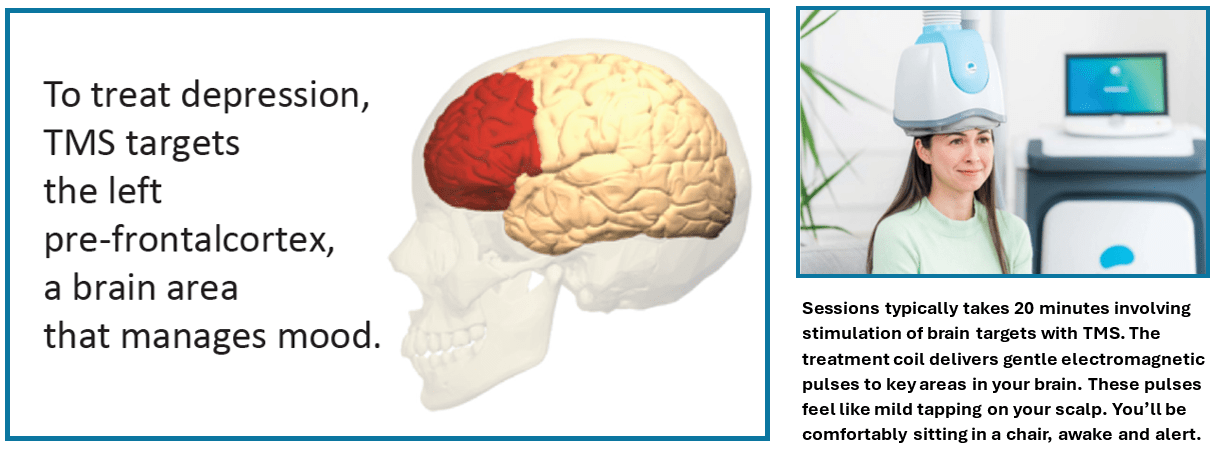Transcranial Magnetic Stimulation (TMS)
This Is A
Revolutionary Approach to Treating Depression
Imagine a machine that can alleviate depression by emitting gentle magnetic pulses into the brain. While it may sound like the stuff of science fiction, this treatment, known as transcranial magnetic stimulation (TMS), is very much a reality. Available at Coos Bay’s Ko-Kwel Wellness Center, TMS has achieved 75% beneficial clinical response for patients.
Is TMS Suitable for You?
Depression is a significant issue in the United States, particularly among individuals aged 15-44. It stands as the leading cause of disability and results in over $200 billion in lost earnings annually. However, TMS is not a universal solution. However, for some patients who continue to struggle with depression even through medication or psychotherapy alone, TMS has been proven to help patients achieve remission.
Ashley Phillips, Psychiatric Mental Health Nurse Practitioner (PMHNP) with KWC-Coos Bay, has been using the TMS device as an adjunct therapy, meaning it is used in conjunction with antidepressant medication to maximize effectiveness.
Once Ashley has determined that TMS is suitable for a patient, the patient must commit to four weeks of five treatments per week. After that, treatments taper down to two or three a week for four more weeks.
Noise is a minor drawback. Like magnetic resonance imaging (MRI), the TMS device clicks loudly. So, the patient and the medical professionals wear earplugs. However, the clinical benefits are proven and this non-invasive treatment can help conquer depression. KWC also offers smoking cessation treatments, which have also proven beneficial.

Expanding Applications of TMS
The Federal Drug Administration (FDA) has approved the use of TMS Beyond its use in treating depression and smoking cessation. It is also approved for treating for obsessive-compulsive disorder (OCD) and post-traumatic stress disorder (PTSD). The Department of Veterans Affairs is currently investigating its potential for treating traumatic brain injuries, and former football players with brain injuries are exploring its benefits as well.
At this time, KWC only offers treatment for major depressive disorders that are non-responsive to medication alone and for support in smoking cessation.
To schedule an appointment with Ashley Phillips, PMHNP to discuss your situation and what TMS can offer, please call the KWC-Coos Bay at 541-888-9494, option 1 and ask for a TMS consultation.
Below are brochures provided by the TMS manufacturer for additional reference.
TMS for Major Depressive Disorder
Meet Our TMS Professional
KWC-Coos Bay

A life-long member of the community, Ashley grew up in Myrtle Point. Leaving for college, Ashley returned to bring her expertise back to the Coos Bay community. Ashley completed her entire clinical rotation at the KWC which provided her with mentorship from a peer provider.
Ashley has become familiar with the Clinic and the members we serve.
An avid lover of the outdoors, Ashley and her family enjoy gardening, camping, hiking, biking, and fishing. Ashley is a self-motivated adventurist with a hidden talent as a clarinetist. She looks forward to contributing to the mental health of her patients and creating relationships with the Tribal community.
Ashley manages mental health medication for patients and provides compassionate mental health services to children ages 4 and above. Ashley also offers TMS (Transcranial Magnetic Stimulation) treatments for smoking cessation and major depressive disorder.
Coos Bay
(541) 888-9494
(800) 344-8583 toll free
(541) 888-5556 Fax
630 Miluk Drive
Coos Bay, OR 97420
Eugene
(541) 916-7025
(541) 916-7048 Fax
2401 River Road, Suite 101
Eugene, OR 97404